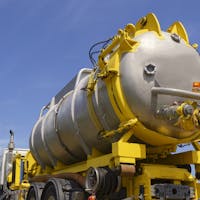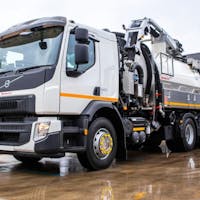Find the Best Vacuum Truck Hire Near You
- Post a job
- Receive multiple quotes
- Choose your preferred Vacuum Truck supplier
Where do you need Vacuum Truck Hire?
Describe your job and our suppliers will send you quotes
789 Vacuum Trucks Available for Hire on iseekplant
Whether you're in construction, municipal services, or industrial sectors, vacuum excavation trucks are vital for waste management and clearing underground services. With iseekplant, you’ll find 789 vac trucks available to hire across Australia, ensuring the perfect solution for your next project. Our platform offers an extensive range of equipment, from compact vac truck models for tight areas to larger units with larger spoil capacity for demanding industrial tasks. Whether you're managing sewer lines, clearing blocked pipes, or performing non destructive digging, we connect you with trusted suppliers to match your needs.
This guide covers vacuum excavators, hire rates, common truck sizes, and alternative equipment to help you plan your excavation area requirements with ease.
Vacuum Truck Hire Rates Guide
Hiring sucker trucks is a cost-effective solution for removing large volumes of waste materials or fluids to clear blocked pipes and more. Rates depend on the truck’s capacity, hire duration, and any additional services, such as high pressure water blasting:
| Size/Capacity | Wet Hire Rates (per hour) | Dry Hire Rates (per hour) |
|---|---|---|
| 1,000 - 2,000 litres | $130 - $160 | $110 - $140 |
| 2,001 - 5,000 litres | $160 - $190 | $140 - $170 |
| 5,001 - 10,000 litres | $190 - $220 | $170 - $200 |
| 10,001 - 20,000 litres | $230 - $260 | $210 - $240 |
| 20,001+ litres | $270 - $300 | $250 - $280 |
Note: All prices listed on this page are estimates, exclude GST and are in AUD.
Additional Costs to Consider When Hiring a Vacuum Truck
When planning to hire vac trucks, consider these potential additional costs:
| Potential Cost | Description | Standard Rate |
|---|---|---|
| Operator Fees | Trained operator to manage the vacuum excavator. | $30 - $40 per hour |
| Disposal Charges | Costs for disposing of waste at approved sites. | $60 - $90 per ton |
| Transportation Costs | Moving the truck delivers unsurpassed performance to your site. | $120 - $180 per trip |
| Specialised Equipment | Attachments for tasks like air vacuum or hydro excavation. | $30 - $60 per hour |
| Overtime Rates | For operations beyond standard hours. | 1.5x the standard rate |
Connect with our suppliers with the Get a Quote tool for a customised and accurate quote based on your project today!
Common Vacuum Truck Sizes and Capacities
The right vacuum truck size ensures efficiency and cost-effectiveness for tasks like non destructive digging, clearing blocked pipes, or managing underground utilities. Here’s a breakdown of typical sizes:
| Size | Capacity | Common Uses |
|---|---|---|
| Small | 2,000L | Residential tasks, easy access to tight areas. |
| Medium | 5,000L | Commercial cleanups, industrial sites. |
| Large | 10,000L | Major municipal projects, large industrial tasks. |
Leading Brands in Vacuum Truck Manufacturing
Choosing the right brand impacts operational efficiency, especially for specialised tasks like sewer lines or underground utilities. Here’s a quick comparison of top brands:
| Brands | Notable Models | Sizes | Quick Specs | Pros | Cons |
|---|---|---|---|---|---|
| International | DuraStar 4300 | 11,000L - 15,000L | High suction rate | Durable build, long service life | Costly for smaller tasks. |
| Kenworth | T880 | 17,000L - 22,700L | Advanced tech features | Reliable, integrates technology | Higher upfront cost. |
| Freightliner | M2 106 | 9,500L - 15,000L | Versatile build | Adaptable for different tasks | Maintenance-intensive. |
| Peterbilt | Model 348 | 15,000L - 24,600L | Powerful engine | Ideal for heavy-duty tasks | Higher fuel consumption. |
These brands offer exceptional manoeuvrability and reliability, with models suited for various project scales.
Alternative Excavation Equipment to Vacuum Trucks
While vacuum excavation trucks excel in liquid and slurry removal, other machines may suit different needs:
| Alternative Equipment | Practical Applications | Pros | Cons | Vs. Vacuum Trucks |
|---|---|---|---|---|
| Backhoes | Digging, trenching, material handling | Versatile for solid tasks | Ineffective for liquid removal | Ideal for solid excavation only. |
| Excavators | Deep digging, material removal | Powerful for large projects | Requires space, not liquid-specific | Best for large projects, not slurry. |
| Trenchers | Digging trenches for pipes and cables | Precise for trenching tasks | Limited to trenches | Good for trenching, not diverse. |
| Skid-Steer Loaders | Compact digging in small spaces | Great for tight areas | Limited capacity | Best for small sites, no liquids. |
| Bulldozers | Clearing areas, moving dirt | Handles high volumes of dirt | Lacks precision for detailed tasks | Surface work only, no liquid removal. |
Set Your Project in Motion with iseekplant!
For vac trucks, non destructive digging, or vacuum excavation trucks, iseekplant is your go-to platform. Our great range of suppliers offers options from compact vac truck models to vacuum excavators with larger spoil capacity, ideal for high pressure water blasting or air vacuum tasks. Need help? Email projects@iseekplant.com.au or call 1300 691 912. Ready to find the right solution for your excavation area? Click 'Get a Quote' today!
Popular Vacuum Truck Hire Locations
Become a supplier
Recent Vacuum Truck Hire reviews
"For several years, our complex struggled with poorly constructed and maintained Onsite Retention Tanks, which caused stormwater to flood the bin bay a..."
- Greg HView profile"Used LVT Civil to pot hole services, really professional and hard workers no time wasting with this crew. Got in and got the job done. Definitely use ..."
- RichardView profile"Great Service , Arrived on time all their guys put in a great effort to complete our works on time I highly Recommend Scott and his team"
- JAMES CORRYView profileHow It Works
Vacuum Truck Hire FAQs
Here are some frequently asked questions and tips on finding the right vacuum truck supplier for your job.
What do we have to offer?
Want to Know More?
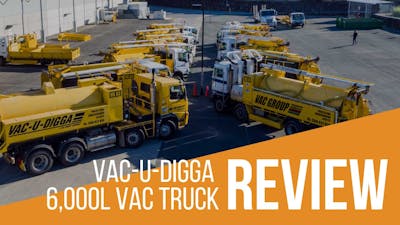
6000L Vac-U-Digga Vacuum Excavation Truck Review & Specs
If you’re looking to invest in a sucker truck that's been engineered for...
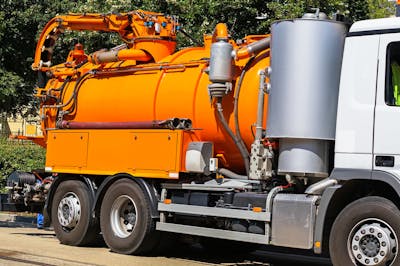
Do you Need a Licence to Operate a Vacuum Truck?
Whether you need a license to operate a vacuum truck or not can be a di...
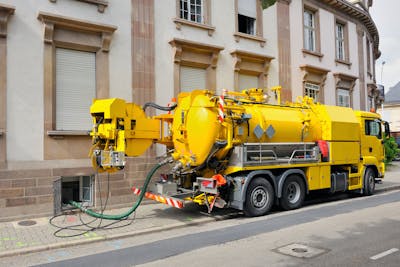
What are the best vacuum truck manufacturers?
When you’re looking to hire a vacuum truck for a vacuum excavation job...
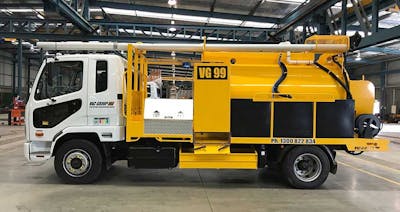
3000L Vac-U-Digga Vacuum Excavation Truck Review & Specs
If you're a company that needs to complete sub-surface excavation in ord...


